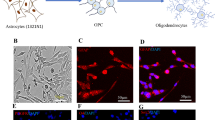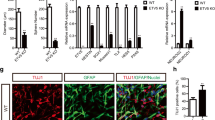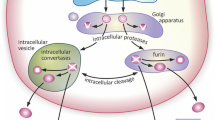Abstract
Our understanding of how human glial cells are induced to produce nitric oxide and how the production is regulated may allow us to better design therapeutic strategies for treating inflammatory diseases of the central nervous system in man. Cultures of human fetal astrocytes and microglia produce inducible nitric oxide synthase and nitric oxide in response to Interferon gamma and Interleukin 1 beta. The mRNA for the enzyme was induced by 2 h and returned to baseline by day 2; the protein was expressed by 24 h and was present in cells for the entire 7 days of culture. Nitric oxide was not seen in cell supernatants until day 3 reaching a peak by day 7. Footprints of nitric oxide production such as NADPH diaphorase and nitrotyrosine staining as well as cGMP production were not significantly above background until day 3 to day 4, rising steadily until day 7. These data suggest that while the type II nitric oxide synthase is induced in human glial cells within 24 h of stimulation, it is not a functionally active enzyme until 48–72 h later, implying that there is a posttranslational regulation of the enzyme limiting nitric oxide production in these cells.
Similar content being viewed by others
Author information
Authors and Affiliations
Rights and permissions
About this article
Cite this article
Ding, M., Merrill, J. The kinetics and regulation of the induction of type II nitric oxide synthase and nitric oxide in human fetal glial cell cultures. Mol Psychiatry 2, 117–119 (1997). https://doi.org/10.1038/sj.mp.4000222
Accepted:
Issue Date:
DOI: https://doi.org/10.1038/sj.mp.4000222
- Springer Nature Limited




